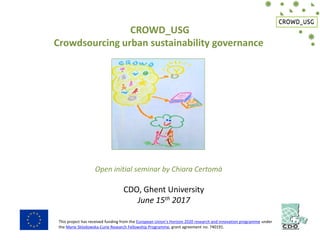Crowdsourcing Urban Sustainability Governance_Presentation
- 1. CROWD_USG Crowdsourcing urban sustainability governance Open initial seminar by Chiara Certom├Ā CDO, Ghent University June 15th 2017 This project has received funding from the European UnionŌĆÖs Horizon 2020 research and innovation programme under the Marie Sklodowska-Curie Research Fellowship Programme, grant agreement no. 740191.
- 2. Where CROWD_USG comes from
- 3. Building blocks 1. focus on urban sustainability governance 2. transformation of traditional participatory processes 3. emergence of web for society and democracy
- 4. URBAN SUSTAINABILITY GOVERNANCE Participation: people involvement in knowledge production and decision-making Multidimensionality: balance of the ecological/environment al measures with social measures Equality: mechanism to promote social and environmental justice (recognition, redistribution, empowerment) Purposiveness: operationalize principles of ecosystem protection, environmental management and human needs Collaboration (internal): substantive agenda sharable by institutions, businesses, civil society organisations, NGOs and people based on reciprocity Cooperation (external): links between international and transnational actors in order to global environmental goals Adaptability: progressive and dynamic goal- changing agenda Transparency: advancing effective democratic institutions 1. focus on urban sustainability governance
- 5. 2. transformation of traditional participatory processes https://www.youtube.com/watch?v=QEWlsiEyuZ4 https://openideo.com/ research design data production/collection data analysis/discussion/elaboration definition of tools and procedures for data sharing and disclosure Participatory research Participatory decision-making priorities definition policy definition implementation measures assessment
- 6. Emerging forms of participation Harvesting data, opinions and knowledge Enhancing peopleŌĆÖs social participation and political empowerment tools (e.g. smartphone software, blogs, wikis, social bookmarking applications, social networking, peer to peerŌĆ”) open access data-bases and open-source software 3. emergence of web for society and democracy
- 8. private organisations public sector information gathering, large- scale data analysis, ideation problems with empirically provable solutions or where solutions are matters of taste by fostering innovative contributions in research-design or policy-making problem solving, creative input generation, opinion poll, outsourcing task, or raising money for the sake of the proposing organisation itself
- 9. Different forms of crowdsourcing 1. collaborative contents (e.g. Wikipedia), multiple content aggregators (e.g. Flickr, YouTube and Twitter), big-data analysis applications (e.g. data mining software Many Eyes; or cluster and social networks mining NodeXL) 2. networked system of sensing devices, social media and mobile communication networks for data-processing (e.g. Citizen Cyberlab EU project), collaborative peer-production (e.g. Public Lab organisation or the HackteriaLab2014) 3. Social mapping: map creation, data management and storage, peer-to-peer and information sharing and improving maps functionalities
- 10. Certom├Ā, Corsini, Rizzi, 2015
- 11. Digital Agenda for Europe
- 12. CROWD_USG objectives GENERAL AIM to investigate whether and how crowdsourcing processes can advance real participatory knowledge and policy-making in the governance of urban sustainability. SCIENTIFIC OBJECTIVES ŌĆó Reviewing current knowledge on the adoption of crowdsourcing processes for fuelling participatory governance processes and dealing with urban sustainability issues; ŌĆó Analysing the functioning of digital technology in the city governance by analysing forefront applications in a real case study (i.e. the city of Ghent); ŌĆó Prefiguring future governance scenarios that are likely to occur by introducing crowdsourcing for sustainability in a real case (i.e. the city of Ghent); ŌĆó Analysing how technological agency (and crowdsourcing in particular) can transform knowledge production and decision-making processes; ŌĆó Outlining a general USG model characterised by the implementation of relevant crowdsourcing processes and tools; COMPLEMENTARY OBJECTIVES ŌĆó Effectively managing the case study through a appropriate combination of direct and indirect data-retrieving methodologies (see Research methodologies and theoretical approach); ŌĆó Illustrating the case study results by granting public engagement via internet-based tools, public events, media coverage, and a wide range of deliverables aimed at different audience (general public, policy-makers, academia)
- 13. Overview of the action and workflow Analysis of the different crowdsourcing processes and tools available for governance purposes Analysis of the convergences between crowdsourcing and the USG requirements Exploration of the ICTs-based USG processes activated in Ghent through application of ANT analytic tools to the case study (interviews) Building future urban sustainability governance scenarios Analysis of the impact of crowdsourcing on participatory process in both knowledge-production and decision-making.
- 14. Crowd-USG methodology ŌĆó Ant ŌĆó Rapid Appraisal ŌĆó Scenario Building
- 15. Heterogeneous (actor)networks (assemblages) Natureculturetechnics domain Distributed agency Things-oriented poli cs Assemblies (collec ves) Listening & speacking devices Material Semio c Postenvironmentalism Affirma ve characters of postenvironmental thinking Refuse of dualism realism-construc vism Repoli cisa on of environmental issues Material Semio c (and ANT) OntologyEpistemologyPolics Knowledge as a set social prac ces Transla on & media on tools Power as consequence of networking
- 17. ŌĆ”comments, suggestions, critiques, endorsement are very appreciated now! Thank you! Chiara.Certoma@Ugent.be www.crowdusg.net

















